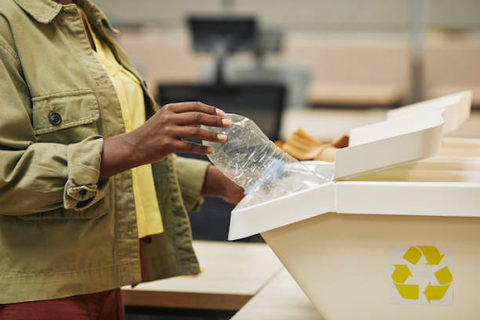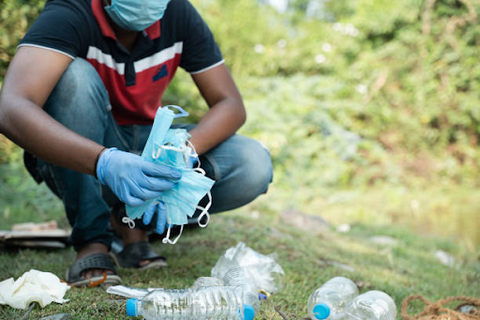Tu carrito está vacío

noviembre 06, 2022 4 lectura mínima
Let’s admit that our waste stream has outgrown its proportion. Hence, if we want the upcoming generations to absorb the beauty of Earth, it would be ideal to adopt measures that promote a healthy environment. The practice of inadequate and harmful waste disposal remains the leading cause of pollution. When it comes to the US alone, more than 100 million tons of garbage are produced per annum. But, a meager 1/4th of the total waste gets recycled, with the rest found in ditches, landfills, or roadsides. In 2013, more than 250 million tons of trash were generated.
In this entire figure, close to 87 million were composted or recycled. With inappropriate garbage disposal contributing toward air and soil contamination and posing a severe threat to human, marine, and animal health, it’s time that we actually look into eco friendly waste disposal methods. Seeking assistance from eco friendly waste disposal methods does not necessarily need you to go all-green. You could integrate a few waste disposal methods into your daily approach.
Every day we ignore recycling, we tend to miss out on a significant amount of waste that can be reshaped into daily products. Materials like glass, plastics, paper, and aluminum that can be reused and recycled again are quite valuable. Through recycling procedures, you can save the environment in several ways. Consider some of these:
Recycled products are used in brand-new products, which require almost twenty-percent energy compared to the power needed to produce items from scratch. Such activity tends to contribute towards a healthy surrounding by alleviating the carbon footprint without sacrificing anything. Moreover, recycled item utilization produced new things, eliminating the need for more raw materials.
Not every material can be recycled. Considering the environmental aspects of inappropriate waste disposal methods, proper disposal units can be a helpful solution. Primarily suited for standard kitchen waste, waste disposal methods can potentially shred considerable waste into meager chunks, decomposing quickly.
Perhaps one of the oldest ways, composting is an efficient way to accommodate waste. Moreover, composting is quite helpful in limiting the adverse effects on our surroundings. Experts recommend that a user utilizes the waste produced from a kitchen, enables its decomposition in a pile, and then uses the formed compost to nourish their garden or backyard.

When you do not dispose of hazardous waste, it can pose a severe threat to the surroundings and humans. Items like polishing and cleaning chemicals, petrol, thermometers, kerosene, batteries, and many more require proper disposal. When combined with standard waste and dumped into landfills, such items can cause soil, water, and air pollution and affect the environment significantly.
Consider utilizing green waste like yard trimming can keep the waste out of yards and landfills and provide much-needed nourishment as feed for animals or to the soil. Experts recommend spreading grass clippings throughout the grass area and effectively managing yard waste.
Every day, millions of people travel to thousands of places worldwide — some for business, some for medicinal tours, and some for sightseeing fun. We call ourselves travelers because of our love for different places. But do we love the places we travel to if we never care to keep them clean? If we look at other ways we impact our environment while traveling, many of us will end up hanging our heads in shame. But knowing better is how we become better. With the help of this post, we intend to inform people how to minimize their impact on nature whenever they travel.
Most travelers tend to dispose of their waste anywhere in the wilderness around them. By seeing others dropping the polluted waters, leaving behind the wrappers of food packets, or throwing the skins of fruits just because someone else does, an individual footprints a tremendous impact on the wildlife. Many notorious individuals chop out the bushes of the trees while passing by. Assuredly, these actions look unimportant yet result in more pessimistic outcomes. Remaining friendly to biodiversity makes things beneficial to you in return. Make sure your existence harms the minimal and heals the utmost possible.
A human ordinarily generates two types of waste. It includes human and material waste. The human waste must be disposed of underground, 6 inches below the surface. It should be at least 200 feet beneath the water reservoirs or paths. The material waste an individual creates must be brought along with the individual. The person should keep the empty food packets, skins of fruits, and wrappers of junk food with oneself and throw the same in the dustbin wherever it is available.

Inspect the campsite frequently to ensure you do not leave any trash behind. Properly disposing of waste is the most prominent way of minimizing the environmental impact. You can even follow a few methods of waste disposal.
Separate the activities and things into three categories: Recycling, Reducing, and Reusing. Many reusable things, like water bottles, toilet paper, and bathroom accessories, can help you leverage the environment. You can trash the recyclable waste at the proper place generated during the travel. One tip - you should pack your trash in appropriate and separate bags for no harm to wildlife. Sometimes it may seem non-harmful, but it can degrade the environment.
An individual can reduce the use of resources as much as possible and not scarce the society's resources. Reducing, Reusing, and Recycling are the best actions of nature. If not, waste disposal methods like those mentioned in the first half can make a considerable shift.

Rather than using the typical products on your journey, try to use eco-friendly products. For example, you can use wood utensils that will not damage the soil when buried in the future. You can use biodegradable toilet paper to enrich land fertility when disposed of properly. There are products available in the market, like paper dishes that carry a seed plant. Using it alternatively to plastic containers could cultivate a tree and do good to nature. Some suppliers offer biodegradable and eco-friendly products that one must carry on travel to impact the environment at least one level.